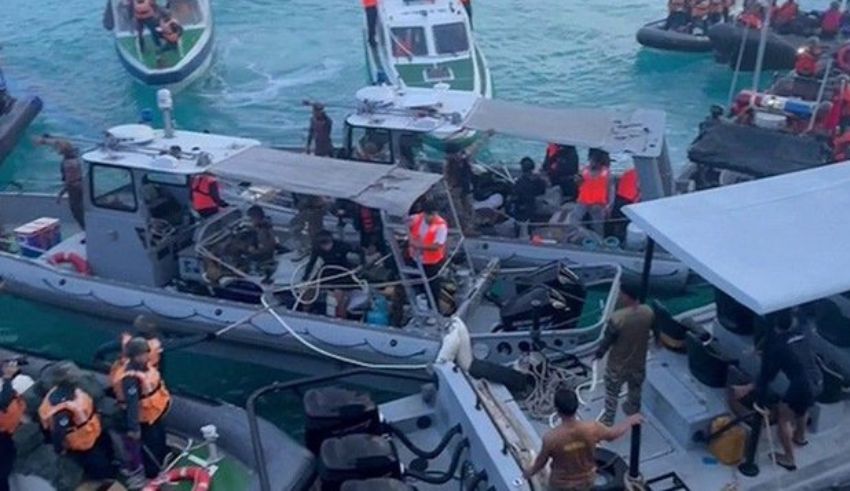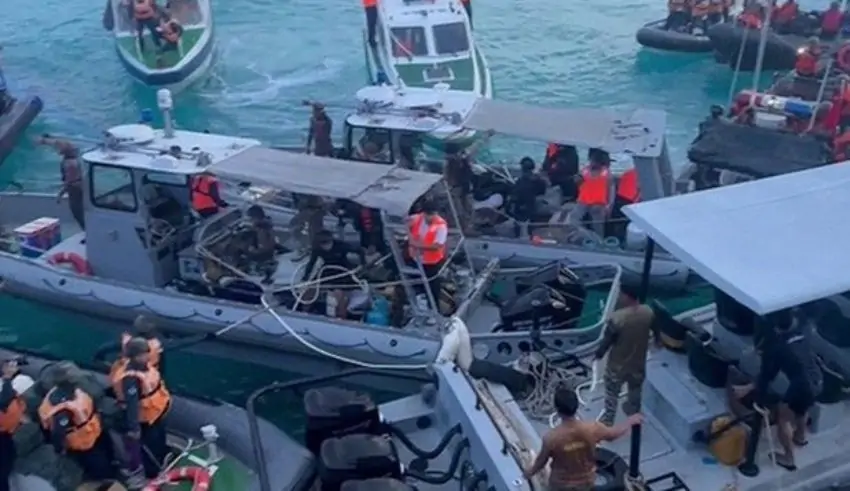

(C) AFP
With a recent collision at Ayungin Shoal causing major injuries to a Philippine Navy servicemember, China’s forceful movements against Filipino forces in the West Philippine Sea (WPS) have heightened regional tensions. This editorial looks at the main features of the occurrence, its wider ramifications, and the geopolitical setting around it.
Particularly by the Pentagon, China’s latest activities have been denounced as dangerous and aggressive. At Ayungin Shoal, a Philippine vessel’s high-speed ramming by the China Coast Guard marks a dangerous escalation. Such actions indicate China’s will to question accepted maritime rules and increase regional instability, therefore endangering lives and posing greater potential for more general conflict.
China seems to be deliberately using these forceful strategies to establish control in disputed areas, therefore violating international maritime rules and the sovereignty of surrounding nations. Such provocations raise the possibility of forceful clashes and a notable military escalation. China’s intentional boundary-pushing could cause further conflict, therefore endangering regional peace.
The United States has responded by reaffirming its backing of the Philippines as the Pentagon denounced China’s activities. This denunciation draws attention from everyone around about China’s policies and their effects on regional stability. The forceful US reaction emphasizes the need of respecting international rules and tells China that its activities will be fiercely opposed.
A Philippine Navy servicemember suffered major injuries in the incident at Ayungin Shoal; he was later evacuated. This episode begs grave concerns about China’s motivations and readiness to intensify disputes. It fits China’s larger aggressive conduct pattern that compromises regional peace and stability.
As China is aggressively claiming territory, there is more chance of additional conflict in the West Philippine Sea. Such events undermine regional peace and security, hence careful surveillance and strong diplomatic initiatives to stop escalation are needed. There is still great chance for miscalculation or inadvertent confrontation; so, a coordinated worldwide endeavor is needed to control and defuse tensions.
Emphasizing the importance of the 1951 US-Philippines Mutual Defense Treaty—which contains clauses allowing armed assaults against Philippine personnel, vessels, or planes in the South China Sea—US Defense Secretary Lloyd Austin has This treaty underlines US dedication to protect its ally, therefore supporting the message to China that forceful measures will elicit a forceful reaction.
Aiming to preserve a rules-based international order in the Indo-Pacific, the US dedication goes beyond bilateral relations. This strategic alliance emphasizes a common vision of a free and open Indo-Pacific in which respect of international law and sovereignty is shown. Maintaining regional peace and counteracting China’s disruptive activities depend on the US-Philippines cooperation.
The strengthened US-Philippines relationship underlines the need of a stable Indo-Pacific area. But China’s activities compromise regional peace and stability, therefore endangering this ambition. Such provocations must be forcefully addressed by the international community if we are to keep a stable and peaceful regional order.
The activities of the China Coast Guard at Ayungin Shoal jeopardize not only the Philippines but also more general regional peace and security. Maintaining world maritime rules and stopping more escalation depend on a strong worldwide response. Preserving stability in the Indo-Pacific and opposing China’s belligressive actions depend on group effort.
With major consequences for regional security, the latest incident in the West Philippine Sea emphasizes growing tensions between China and the Philippines. The United States has denounced the forceful activities of the China Coast Guard, therefore reinforcing its will to protect its friend in the Philippines. The whole community has to be alert and cohesive in preserving sovereignty and international law in the Indo-Pacific area as the crisis develops.
The fifth prisoner exchange took place on 6 May 2025 between Russia and Ukraine involving 205 prisoners and it is…
Established in the year 1921 and it still continues to showcase the legacy of this game through generations. This ‘Emperor’s…
The NBA Playoffs of 2025 would have much perdition during the matches of the second round. In the East, the…
Jimmy O.Yang, the Asian standup comedian established his name in the international stage and he is more popular among the…
Bill Gates of the Bill & Melinda Gates Foundation declared during the Philanthropy Asia Summit on May 5, 2025 that…
The game changer of the Netflix streaming is the South Korean nail biting survival thriller web series “Squid Game” and…
This website uses cookies.
Read More